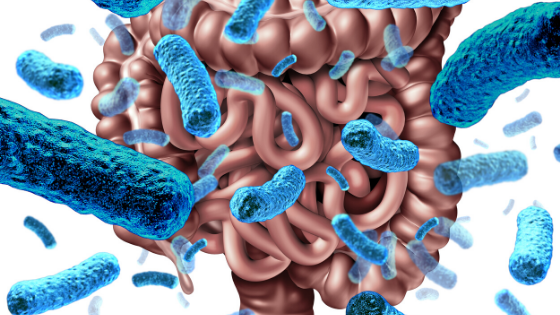Humans are superorganisms, full of trillions of microbiota like bacteria, viruses, and fungi that are known collectively as the microbiome. While we often associate bacteria with disease, the organisms that make up the microbiome are an extremely important part of your immune system and overall health. So what is it, where is it, and why is it so crucial to have a healthy microbiome? Let’s dive in.
What is the Microbiome?
Microbiota exist throughout your body, with an especially high concentration found in the intestines. A majority of intestinal microbes inhabit a “pocket” of your large intestine called the cecum, and that’s who we’re talking about when we refer to the gut microbiome. These microbes are essential for human development, immunity, and nutrition. The microbiome is even labeled a supporting organ due to the many key roles it plays in promoting the day-to-day operations of the human body.
While some of the microbes in our bodies are pathogenic (meaning they promote disease), most of the microbiome is symbiotic—both the human body host and microbiota living there are benefitting from the relationship. In a healthy body, these pathogenic and symbiotic microbiota coexist without problems. If infectious diseases, specific diets, or prolonged use of antibiotics or other bacteria-destroying medication cause a disturbance in that balance, then dysbiosis occurs, which stops the normal microbial interactions that we rely on to keep us healthy. As a result, the body may become more susceptible to disease.
How the Microbiome Develops
Every individual has a unique network of microbiota that is influenced by both their DNA and their environment. During delivery, infants are exposed to their parent’s microbes in the birth canal, and breastfeeding introduces additional microbes. As we grow, our microbiomes continue to diversify and evolve with more environmental exposures, foods and diet patterns, certain medicines, and life experiences. These changes may be beneficial to our health or place us at greater risk for disease, depending on how each of our microbiomes responds to these unique variables.
How the Microbiome Affects Our Bodies
- Gut health: Irritable bowel syndrome (IBS) and inflammatory bowel disease (IBD) symptoms are influenced by the microbes (or lack thereof) in our gut
- Digesting fiber: Certain gut bacteria help digest the dietary fiber needed to help prevent conditions like diabetes, heart disease, and some cancers
- Heart health: The microbiome produces chemicals that may block arteries and lead to heart disease
- Blood sugar: The gut microbiome plays a role in controlling blood sugar and may also affect the onset of type 1 diabetes in children
- Immune system: The microbiome communicates with immune cells and can control how your body responds to infection
- Brain health: The microbiome affects brain health by producing chemicals like serotonin and communicating with nerves connecting to the brain
- Weight: Gut dysbiosis may lead to weight gain, but consuming probiotics can help restore gut health and reduce weight
How to Improve Your Microbiome Health
The health of your body and microbiome is ever-changing, and that means it’s never too late to improve it.
Here are a few ways to improve your microbiome health:
- Eat the rainbow: Consume a diverse range of foods that contain fiber to help promote the growth of healthy Bifidobacteria.
- Fermented foods: Fermented foods contain healthy bacteria, mainly Lactobacilli, that can reduce the potential risk of disease.
- Prebiotics: Feed healthy bacteria in the gut by eating prebiotics, a type of fiber that helps gut microbes thrive.
- Whole grains: Eating beneficial fibers and carbohydrates such asbeta-glucan, which are digested by gut bacteria, can benefit weight, cancer risk, diabetes, and other disorders.
- Plant-based diet: Vegetarianism and veganism can reduce levels of disease-causing bacteria such as E. coli, as well as inflammation and cholesterol.
- Probiotics: Probiotics are live bacteria that can help restore the gut to a healthy state after dysbiosis.
- Positive psychology: Positive psychology is a tool you can use to implement healthy habits and make lifestyle changes that foster a healthy microbiome. Recently, Dr. Sandi joined The Microbiome Report podcast to discuss the powerful connection between the microbiome and positive psychology. Listen to the episode, “Can You Think Yourself Well?”, here.
The more you know about the microbiome and its role in controlling digestion, supporting your immune system, and many other aspects of health, the better you can cultivate gut health for yourself or your clients.
To learn more, check out these resources:
Hair, Marilyn, and Jon Sharpe. “Fast Facts About The Human Microbiome.” University of Washington Center for Ecogenetics and Environmental Health, depts.washington.edu/ceeh/downloads/FF_Microbiome.pdf.
“The Microbiome.” The Nutrition Source, 4 Sept. 2019, www.hsph.harvard.edu/nutritionsource/microbiome/.
Proal, Amy D, et al. “The Human Microbiome and Autoimmunity.” Current Opinion in Rheumatology, U.S. National Library of Medicine, Mar. 2013, www.ncbi.nlm.nih.gov/pubmed/23370376.
Ursell, Luke K, et al. “Defining the Human Microbiome.” Nutrition Reviews, U.S. National Library of Medicine, Aug. 2012, www.ncbi.nlm.nih.gov/pmc/articles/PMC3426293/.
Our Latest Blogs
-

Student Spotlight: Debra Lewis
Read Full Article: Student Spotlight: Debra Lewis -

DTC Lab Testing Summit: From Results to Lifestyle Change
Read Full Article: DTC Lab Testing Summit: From Results to Lifestyle Change -

Enabling Predictive Health through Multi-Omic Analysis
Read Full Article: Enabling Predictive Health through Multi-Omic Analysis

